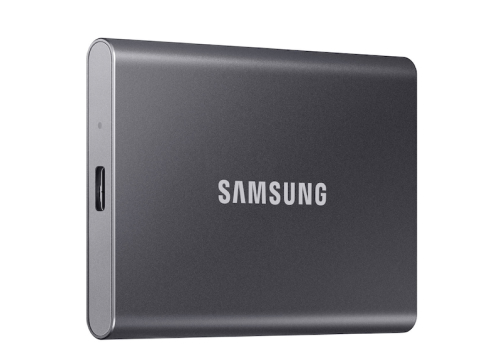Best External Hard Drives For Music Production
Sep 11, 2022
As music producers and engineers, you’ll quickly learn that sound libraries and Logic Pro Projects take up a lot of storage and require a lot of CPU, especially for big sessions. Your external hard drive can make or break your workflow.
Look at the size of my average Logic Pro file, below. I start a new file every day, some times twice a day. The files could get up to 5 GB as well. Not to mention, I have same libraries that are over 500 GB in size, that's too many sounds!
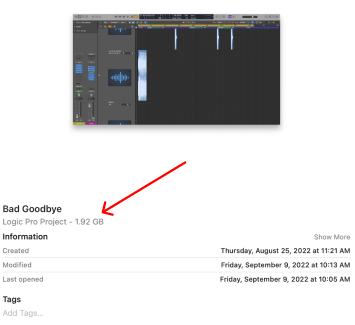
If you're just starting out with music production, you may not realize this yet but as soon as you start working with more clients, libraries, even software instruments, space becomes a concern. Especially if you're using a limited MacBook Air with a stock storage capacity of 120 GB. My MacBook Pro has 1TB of storage but I still have multiple drives in arm's reach.
My main DAW (digital audio workstation) is Logic Pro but these external hard drives will work with any DAW and any computer. With that said, drives need to be formatted to the proper computer OS though. However, must drives can be reformatted directly on your computer.

I'm going to list 5 options for you to consider when buying an external hard drive. First though, it's important that we get on the same page with a very important aspect of external hard drives. This concept is SSD vs HDD. It's something you'll need to wrap your head around before hard drive shopping.
What Is SDD vs HDD?
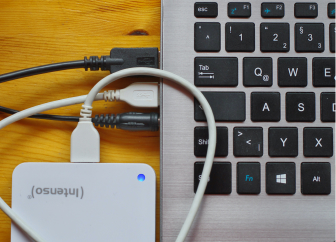
SSD stands for solid state drive. This is my preference for hard drive but there are still benefits for HDD drives, we'll get into that soon. For one, SSD is faster, quieter, and smaller. These are the main reasons they are usually preferred over HDD in music production projects. For example, imagine recording vocals and the fan to your HDD drive is noticeable in your recordings. Not good.
HDD stands for hard disk drive. You might be thinking now, why would anyone get an HDD? Well, first, hard disc drives are cheaper and the price is quite significant. HDD drives are great for archiving old files that you likely won’t need to work on. Let's say you have a some old Logic Pro projects or old sound libraries and samples you don't use regularly but you'd still like to keep. If that's the case, then an HDD would be a good choice for you. On the other hand, if you are storing samples and projects that you use regularly and need access to all the time, SDD's are worth the investment for their speed.
Another thing to keep in mind is that the speed will always be limited by the slowest link in the chain, so if you have a slow laptop, the laptop will limit the speed. Thunderbolt and USB 3.1/3.2 connections are faster than USB 2.0, so if you have the right ports, get a hard drive without USB 2.0 connections. If you need an adapter to convert, it will still be as slow as the weakest link.
Storage
Another important piece of information you'll need to decide on before purchasing an external hard drive for music production is storage. How much do you need right now? How much will you need in the future? Should you plan for the long term instead of buying multiple hard drives?

The amount of storage you’ll want depends on how large your sound libraries and project files will be.
Keep in mind that moving sound libraries from an external hard drive to a different location is what causes the most issues and usually requires you to relink your sounds (which can take 5 minutes for every Logic Pro session that use the sound libraries you moved).
In almost every case, it’s better to buy more storage than you currently need in case you grow your files and sound libraries. I can't tell you how many times I've thought I've had enough storage but it fills up faster than you think. You might think 500GB is a lot but it goes quick! My most recent hard drive purchase has 8TB of storage. It's filling up but I still have lots of headroom.
In general, you'll likely not want to have your sounds on two different hard drives but there are some reasons you might. Typical storage options are 500 GB, 1 TB, 2 TB and 4 TB. I would recommend not getting less than 1 TB if you’re serious about music production. It really will depend on what you need storage for. You might not need 8TB like me, unless you also very large sound libraries and years worth of huge projects.
Let's dive a bit deeper on external drive speed before recommend some of the best options.
Speed vs Price
You'll notice as you go through the options, some hard drives will be expensive. Some will be cheap. Storage is a big reason, which we discussed above, for the price on an external hard drive. Another big reason why an external hard drive might be cheap or expensive is the speed.
For example, let's say you're producing a song in Logic Pro, and you're looking for a kick drum sample to build a beat. You open up your file browser in Logic Pro and search through your external hard drive. The speed at which you can open files and discovery new kick sounds in your external hard drive will depend on its speed.
You'll notice on the product description for each drive, there will be a MB/S number. This is your speed number. It stands for megabytes per second. For example, the Crucial X6 has 540 MB/S. However, the Samsung T7 has 1050 MB/S. The higher MB, the faster it is. In the case of external hard drives for regular use, faster is always better.
To go one level deeper, you'll want to take a look at the write speed as well. In general, on an external drive you will have read speed and write speed. In most cases, you can almost guarantee that if you have a fast read speed than it should have a fast write speed as well. However, double check just to be sure.
5 Options For Music Production External Hard Drives
1. Samsung T7
The Samsung T7 is a solid SSD with great performance and security features. However, I recommend buying an additional connecting cable because the ones that come with it are short and prone to being loose in the ports. Although, you might think of them as just "cables" they matter quite a lot to the performance of the drive. For example, I recommend this 3-foot Anker cable.
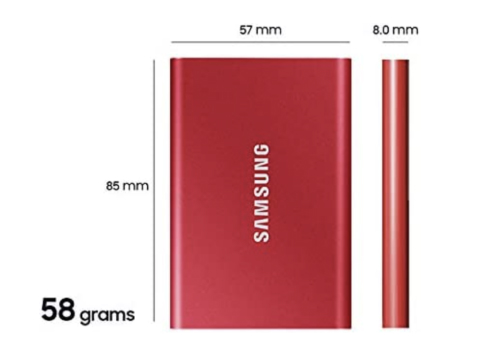
You can a look at purchasing the Samsung T7 here. You'll notice that you can get the T7 with a variety of different storage options, including, 500GB, 1TB, and 2TB. One of the my favourite parts of the T7 is it's size and weigh. Take note of the image above. It's almost too small where you might be worried about actually loosing it! Another great option fo the T7, because of its size, is to host your plugin information. This is helpful if you move around to different studios to produce in but need to bring all your paid plugins with you.
2. Samsung T7 Shield
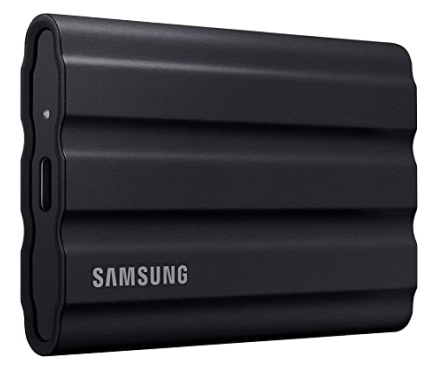
The Samsung T7 Shield is like the bigger sibling of the Samsung T7. However, this sibling goes to the gym a lot more and is way tougher. You would be interested in the shield if you’re worried about file damage. For example, this SSD drive gives you everything the T7 does but more. It includes water resistance and more ruggedness. The picture says it all. Just like the original T7, there’s the same issue with the connecting cables, so I recommend buying this cable. You can look at purchasing the Samsung T7 Shield here.
You'll notice the shield also has different storage options of 1TB and 2TB. It's also great for travelling. For example, I'm often travelling to produce music in Europe or going on tour and I need something that is rugged.
3. LaCie Portable High Performance SSD
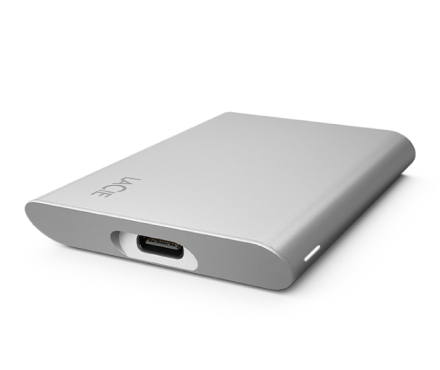
You might recognize the brand La Cie with their orange rubber trademark they have around the edges on most of their hard drives. They're super popular among the photography and videography communities. Like Samsung, LaCie is a trusted brand when it comes to hard drives. It’s shock-resistant and a little more rugged than the regular T7. They come with a huge variety in storage options. This specific SSD has 500GB, 1TB, and 2TB options. You can look at purchasing the LaCie Portable High Performance SSD here.
4. SanDisk Extreme Portable SSD
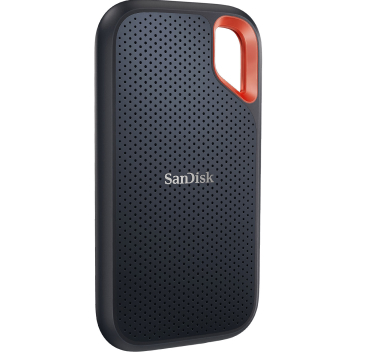
The SanDisk Extreme Portable is a great choice for both speed and file protection. It’s water resistant and should survive if you accidentally drop it. Great for travel and moving around. Also, it includes password protection so your files will be kept secure if it falls into the hands of someone else. The storage capacities come in 500GB, 1TB, 2TB, and 4TB. You can look at purchasing the SanDisk here.
5. Crucial X6
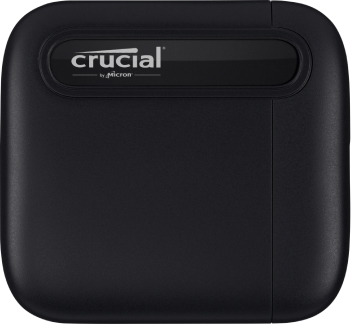
The Crucial X6 would the cheapest available option that would still get the job done right. The price is very reasonable but this is because it's slower than the other options. However, you can't beat that price! You can look at purchasing the Crucial X6 here.
Final Thoughts On Music Production External Hard Drives
There are many different use cases for buying an external hard drive and you're going to be using yours differently than me too.
Make sure you ask yourself, what are you using your external hard drive for? Is it store old Logic files for nostalgia? Is to store samples and sound libraries that you use on a regular basis? Or maybe you're working with a band for an entire week and you need something specific for them. There's going to be different use cases and each use case will have a different answer.
If it's just to store old Logic files or old samples or sounds then an HDD will work fine. If it's for daily use then an SSD would be your option, you'd also want to focus on speed and storage.
I'd love to help you out more on your music production journey. Let me know if you have any questions in a youtube comment or take a look ay my 6 free pillars on learning Logic Pro faster.


